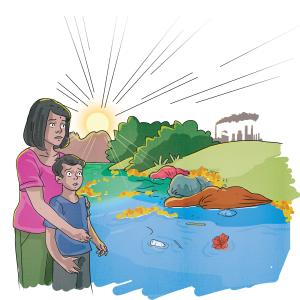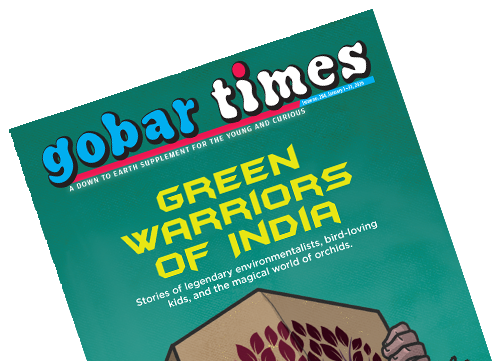
This entry won the first prize in the Class 6–8 category of the Dialogue Dhamaka Contest. This comic contest invites young eco-enthusiasts to give Babbi her voice—capturing wit, wisdom, and critical thinking about food and climate. Participants explore Babbi’s world, learn from her adventures, and craft dialogues that bring her quirky insights to life. The most creative entries are edited and published here to celebrate their talent.
Just as forests are called the ‘lungs of the earth’, wetlands are the ‘kidneys’ that regulate water and filter waste from the landscape. Wetlands include mangroves, peatlands and marshes, rivers and lakes, deltas, floodplains and flooded forests, rice-fields, and even coral reefs.
Wetlands exist in every country and in every climatic zone, from the polar regions to the tropics, and from high altitudes to dry regions. In India, around 4.63% of the geographical area is wetlands. A total of 757,060 wetlands have been mapped in the country.

We observe World Water Day every year on March 22, to highlight the importance of water. But how much attention do we give to the amount of water we use everyday? According to a 2008 World Bank report, an average Indian household performs approximately 340 wash cycles in a year and this accounts for approximately 40.7 kilowatt hour of electricity, 47.5 kilolitre of water and 27 kilogram (kg) of detergent per household per year. We have to wash our clothes and use water and energy in our day-to-day lives, but here’s a way we can save the environment as well as a lot of money on laundry!

A few kids were tracking their paper boat in a river. Who was to say they would discover dirty truths.

As millions gather for Maha Kumbh 2025, can we ensure our rivers remain clean? Aarav’s journey reveals the urgent need to protect our sacred waters from pollution and neglect.

Dive into River Tales, Festivals, and a DIY Splash—just bring water, petals, and mud!

A fascinating account by a passionate marine environmentalist explaining why seaweeds are environmentally the most sustainable foods on our planet.
*******************************
Hi! Do you guys know what a seaweed is? It’s like the spinach of the sea. You might have eaten it in a roll of sushi or a bowl of green salad or a soup. But most likely, you wouldn’t have tasted it at all. That’s because in India, we don't have a popular tradition of seaweeds. But that's about to change—I believe as the founder of a seaweed food company called The Good Ocean...

Deep dive into the jungles undersea and gather some fascinating facts about the wonder world of seaweeds along India’s coastline.

Between land and water lies a quintessential zone of wetlands. Acting as sponges during surging monsoons and blissful oasis during scorching summers, these marshlands are integral to our climate and our Earth. An abode of exotic plants, birds and animals, they thrive and flourish with biodiversity.
Our greed is throttling these water bodies. Across the country, there are numerous stories of urban wetlands disappearing because of encroachment, environmental degradation and climate change. As summers hit their peak and the usual scramble for water begins in many parts of the country, join Susmita Sengupta on an exploratory tour. What’s more, come prepared with any cases that you know of wetlands in your village/town/city – we would love to hear from some of you as well!

A refreshingly sweet and innocent observation by a child of an otherwise very worrying issue of—river pollution—with a heartwarming appeal for water conservation.
Once upon a time, during the holidays, I was travelling from Delhi to my village nearby. On the way, we guys came across the Yamuna River. Looking at the river, my younger brother instantly commented, “It doesn’t snow in Delhi even during winters. But here, on the river, it seems to have snowed in peak summers!”...
Then, I explained to him that the white foam on the river surface is not snow but the chemical effluents emitted by huge factories. He was shocked to know this. Then, he uttered very dishearteningly, “I so wished to play with the snow…” My Mom and Dad chuckled on listening to his crushing desire and so did I.

In summers this year, some European rivers had dried substantially, causing drought in many parts of the region. It revealed to their surface, some ancient stones with intricate engravings on them. Their markings used to indicate the water-level of these rivers, which served as a common forecasting tool for famines. Such stones were called hunger stones. One such is disclosed at the banks of the Elbe River. Dated to 1616 AD, its rock is etched with a warning in German...
The World Water Woe is real. There is crisis everywhere because our water resources are limited. A lot of water is wasted when we use it carelessly. Therefore, we should conserve it by handling it judiciously.
Watch this inspiring movie Drop by Drop featuring the little heroes of class 3, reminding us about the importance of saving water by following the right practices. These practices focus upon three simple ways of preserving water before, and not after, its consumption. For example...

Water is colourless. But when we observe any large water body, it appears blue. When it has a lot of impurities (or nutrients), it can vary from red, green, white, grey, brown, black to anything that is weird and filthy. Read about some important terms related to different colours of water that we come across in common parlance or which researchers use to understand better this elixir of life.
Bluewater: ‘Why is water blue in colour?’—humans must have raised this question since time immemorial. But in 1921, this query was resolved when Sir CV Raman raised and answered it successfully...

A snippet of the vibrant activities conducted from the kindergarten tiny-tots to the high-school teenagers under the Green Schools Programme
**************************************************************************************
Online education became the talk-of-the-town in 2020 when the entire globe succumbed to an unknown lockdown for more than 300 days. Students became weary and so the entire education community sprung up to the challenge. Country-wide they took to their screens like wildfire, proving their resilience in a jiffy.
At the Pawar Public School, Chandivali, we went a step beyond with the Green Schools Programme (GSP). Organised by the Centre for Science and Environment, New Delhi, the GSP sensitised our youth about environment conservation...

The Yamuna River is the largest tributary of the Ganga. It travels barely a distance of 22 km through Delhi. However, this region contributes to about 80 per cent of its total pollution load. Currently, this stretch discharges waste water from almost 22 drains into the river. Untreated effluents, containing toxins and chemicals, released from houses and industries creates froth (white foam) on the river’s surface. Algae, in addition, prevents sunlight from venturing into the depths of this river. Plus, low water level in the river causes concentration of these pollutants…

Stockholm Junior Water Prize (SJWP) is considered the world’s most prestigious award offered for a research project on water. It is declared every year since 1997 as a part of World Water Week. High school students, aged 15-20 years, who have developed projects solving some of the world’s most pertinent water challenges are eligible to participate in it. Each year, thousands compete in the national competitions held in almost 40 countries across the globe, and hope to represent their countries in World Water Week...

A Freedom Pledge on water—a promise to conserve every drop for our present, before we even reach the future.
*************************************************************************************
My friends call me ‘Water Maniac’. They say I suffer from a ‘reverse’ hydrophobia— perennially worried about water. Basically, dreading the prospect when we won’t have any of it…

Chintu and Chinki were excited to go out for their summer vacations. They were bored of staying at home all through the lockdown. Since their grandparents lived nearby, they had planned to visit their village Tikli. Chintu and Chinki had done all their packing and rode off with their Mom and Dad to the village. As they came close to Tikli, they saw some women carrying pots of water on their heads, walking on the roadside...
The Great Barrier Reef should be put on a list of World Heritage Sites that are "in danger", says UNESCO. UNESCO's World Heritage Committee recommended the listing, recognizing the destruction of the world's largest coral reef. The committee is also urging Australia to take "accelerated action" on global warming. But the Australian government said it would "strongly oppose" the recommendation and argued the reefs are best managed.
The National Geographic magazine has recognised the ‘Southern Ocean’ as the world’s fifth ocean on June 8, 2021. The change in name was in alignment with the National Geographic Society’s initiative to conserve the world’s oceans. The magazine has usually followed the International Hydrographic Organization (IHO) on marine names, it said in an article notifying the change. The IHO had recognised ‘Southern Ocean’ as a distinct body of water surrounding Antarctica in 1937...

